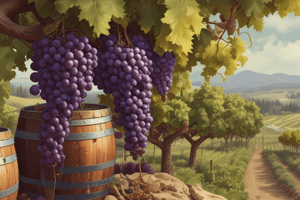Podcast
Questions and Answers
What is the first step in the wine making process?
What is the first step in the wine making process?
- Crushing
- Fermentation
- Pressing
- Harvesting (correct)
What happens during the fermentation step in wine making?
What happens during the fermentation step in wine making?
- Wine is bottled and prepared for distribution
- Wine is aged in oak barrels
- Grapes are pressed to separate from skins and seeds
- Yeast converts grape sugars into alcohol (correct)
What type of wine making results in a crisper, more fruit-forward wine?
What type of wine making results in a crisper, more fruit-forward wine?
- Rosé wine making
- Sparkling wine making
- Red wine making
- White wine making (correct)
What is the purpose of the 'Swirl' step in wine tasting?
What is the purpose of the 'Swirl' step in wine tasting?
Which component of wine tasting assesses the wine's color, clarity, and viscosity?
Which component of wine tasting assesses the wine's color, clarity, and viscosity?
What term describes the wine's sharpness and freshness?
What term describes the wine's sharpness and freshness?
What is the term for the compounds that give wine its astringent, drying sensation?
What is the term for the compounds that give wine its astringent, drying sensation?
What is the last step in the wine making process?
What is the last step in the wine making process?
What is the term for the wine's weight and texture in the mouth?
What is the term for the wine's weight and texture in the mouth?
What is the term for the lingering flavors after swallowing wine?
What is the term for the lingering flavors after swallowing wine?
Flashcards are hidden until you start studying
Study Notes
Wine Making
Steps in Wine Making
- Harvesting: Grapes are picked at optimal ripeness, usually in the early morning to prevent spoilage.
- Crushing: Grapes are crushed to release juice, which is then transferred to a fermentation tank.
- Fermentation: Yeast converts grape sugars into alcohol, producing carbon dioxide as a byproduct.
- Pressing: The juice is pressed to separate it from the skins, seeds, and stems.
- Aging: Wine is aged in oak barrels or stainless steel tanks to develop flavor and complexity.
- Bottling: Wine is bottled and prepared for distribution.
Types of Wine Making
- Red wine making: Grapes are left in contact with their skins during fermentation, resulting in a richer, more tannic wine.
- White wine making: Grapes are pressed immediately, resulting in a crisper, more fruit-forward wine.
- Sparkling wine making: A second fermentation occurs in the bottle, producing carbonation.
Wine Tasting
The Five S's
- See: Observe the wine's color, clarity, and viscosity.
- Swirl: Swirl the wine to release aromas and oxygenate the wine.
- Smell: Identify the aromas, such as fruit, floral, or earthy notes.
- Sip: Taste the wine, assessing its texture, acidity, and flavor.
- Savor: Evaluate the wine's finish, or the lingering flavors after swallowing.
Wine Tasting Components
- Visual: Assess the wine's color, clarity, and viscosity.
- Olfactory: Identify the aromas and bouquet.
- Gustatory: Evaluate the wine's taste, including sweetness, acidity, and tannins.
- Tactile: Assess the wine's texture and mouthfeel.
Wine Tasting Terminology
- Acidity: The wine's sharpness and freshness.
- Tannins: Compounds that give wine its astringent, drying sensation.
- Body: The wine's weight and texture in the mouth.
- Finish: The lingering flavors after swallowing.
Wine and Food Pairing
- Match weight with weight: Pair light-bodied wines with light dishes, and full-bodied wines with rich dishes.
- Complement flavors: Pair wines with dishes that share similar flavor profiles.
- Contrast flavors: Pair wines with dishes that have contrasting flavor profiles.
Wine Making
Steps in Wine Making
- Grapes are harvested at optimal ripeness, usually in the early morning to prevent spoilage.
- Crushing releases grape juice, which is then transferred to a fermentation tank.
- Fermentation converts grape sugars into alcohol, producing carbon dioxide as a byproduct.
- Pressing separates juice from skins, seeds, and stems.
- Aging develops flavor and complexity in oak barrels or stainless steel tanks.
- Bottling prepares wine for distribution.
Types of Wine Making
- Red wine making involves fermentation with grape skins, resulting in richer, more tannic wine.
- White wine making involves immediate pressing, resulting in crisper, more fruit-forward wine.
- Sparkling wine making involves second fermentation in the bottle, producing carbonation.
Wine Tasting
The Five S's
- Observe wine's color, clarity, and viscosity (See).
- Swirl wine to release aromas and oxygenate it.
- Identify aromas, such as fruit, floral, or earthy notes (Smell).
- Assess wine's texture, acidity, and flavor (Sip).
- Evaluate wine's finish, or lingering flavors after swallowing (Savor).
Wine Tasting Components
- Visual assessment involves wine's color, clarity, and viscosity.
- Olfactory assessment involves identifying aromas and bouquet.
- Gustatory assessment involves evaluating wine's taste, including sweetness, acidity, and tannins.
- Tactile assessment involves wine's texture and mouthfeel.
Wine Tasting Terminology
- Acidity refers to wine's sharpness and freshness.
- Tannins are compounds that give wine its astringent, drying sensation.
- Body refers to wine's weight and texture in the mouth.
- Finish refers to lingering flavors after swallowing.
Wine and Food Pairing
- Match weight with weight by pairing light-bodied wines with light dishes, and full-bodied wines with rich dishes.
- Complement flavors by pairing wines with dishes that share similar flavor profiles.
- Contrast flavors by pairing wines with dishes that have contrasting flavor profiles.
Studying That Suits You
Use AI to generate personalized quizzes and flashcards to suit your learning preferences.




